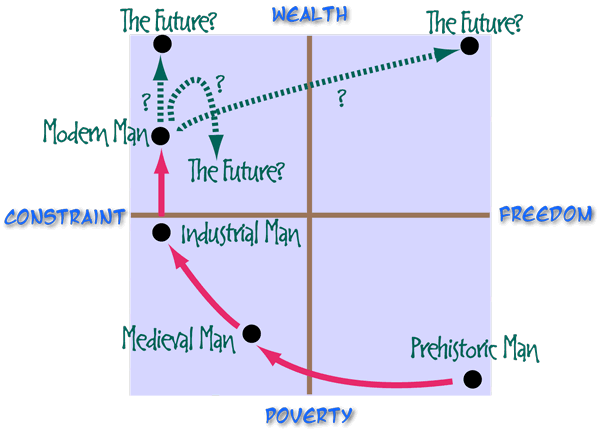Economics, Choice and the Future

Choice is a constant theme of Slow Leadership. It’s so easy to stumble into the future, eyes wide shut, repeating the conventions of past and present and missing the opportunities open to us to make our future different—and better—from what has gone before.
Until today, mankind’s steady increase in wealth—very unevenly distributed, to be sure, but still real—has been accompanied by an equally steady increase in constraints. We assume prehistoric man was free to make virtually all his or her choices, but lived at a scarce subsistence level, in continual danger of starvation and harm from wild animals and aggressive neighbors. By medieval times, poverty was less miserable, but constraints were present in full force: unquestioning obedience to some petty noble and, through him, to the king; swift and violent punishment for misdeeds; total subjection to the rules of the church. The industrial revolution brought a significant increase in wealth, yet many of the daily constraints remained, no longer to the church and nobility, but to the factory owner and overseer. Work was hard, hours were long, pay was small, and benefits minimal. The factory owner no longer commanded obedience by threat of execution, but striking factory workers quickly found he had the full majesty of the law on his side.
Today, in the industrialized world, our wealth is far beyond the dreams of our ancestors. Are we more free from constraints? I don’t see it. People work long hours, still fear the arbitrary loss of their employment, and are expected to obey corporate procedures no less rigid for being written in less personally commanding terms than in the past. Work and the economic needs of shareholders and executives still rank higher than the needs of the individual employee for time off, relaxation, and a working environment free from undue stress and the consequent threats to mental or physical health.
The future is our choice. We can continue to trade freedom for wealth; we can hand over the freedom, only to find the desired wealth is no longer available; or we can decide that wealth is good, but wealth with freedom is still better. As long ago as 1971, J.K. Galbraith explained the dilemma in typically blunt terms:
The quality of life will also suffer if individuals are not an end in themselves but an instrument of some purpose that is not their own. This too is a danger of our situation. We have developed an economic system of great power, We have reason to be grateful for its achievements. But it has its purposes and it seeks naturally to accommodate people and society to these purposes. If economic goals are preoccupying, we will accept the accommodation of society to the needs of the great corporations and the supporting apparatus of the state. We will regret our surrender but we will reconcile ourselves to the inevitable. If we have economic goals in proper perspective, we will question the desirability of such subordination.It can hardly be claimed, 35 years later, that we have economic goals in proper perspective. Thank goodness some few, at least, are questioning the continued desirability of putting economics first and people a distant second.
There is still time to slow down, take a deep breath, and ask ourselves whether the direction we are headed is the one we want to follow. Every day makes this choice seem harder and following the status quo seem more obvious. If we don’t call a halt soon, it is possible we never will.







1 Comments:
Wonderful graph!
I'm almost finished with Erich Fromm's "To Have or to Be?", from 1976, which goes along the same lines.
Not very heartening to observe the world 30 years later.
Post a Comment
<< Home